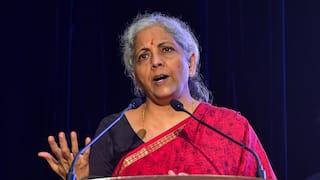Oscars 2023: Shaunak Sen's All That Breathes Loses To Navalny In Best Documentary Feature Category
Shaunak Sen’s documentary 'All That Breathes', which bagged an Oscar nomination for Best Documentary Feature Film, failed to win at the 95th Academy Awards.

Shaunak Sen’s documentary 'All That Breathes', which bagged an Oscar nomination for Best Documentary Feature Film, failed to win at the 95th Academy Awards. The documentary lost to 'Navalny', directed by Daniel Roher.
The other nominations in the category were ‘Fire Of Love’, ‘All The Beauty And The Bloodshed’, ‘A House Made of Splinters’.
'Navalny' tells about the events related to the poisoning of Russian opposition leader Alexei Navalny and the subsequent investigation into the poisoning.
'All That Breathes' explores the rapidly evolving ecology of Delhi through a story that intertwines the fates of black kites and two brothers who set out to save them from death.
Shaunak uses the bird's story to shed light on the relationship between the people of Delhi and their environment. 'All That Breathes' provides insight into the complex relationship between nature and humanity.
Recalling how the film came about, producer Aman Mann told IANS: "I think we are still wondering about it because the film's journey has been beyond our wildest expectations. It all started with a thought process. Shaunak was pursuing a fellowship in the UK in 2018 when he became very interested in human-animal relationships, particularly in spaces such as the city.
"When he returned to Delhi, one day, he was sitting in traffic, and he was looking at the sky, and he saw birds circling above as if they were about to fall off. Just that image got him to do research about birds in Delhi."
Sen, incidentally, is an alumnus of Jamia Millia and received his Ph.D. from the School of Arts and Aesthetics, Jawaharlal University, and got interested in human-animal conflicts in cities when he participated in the Cambridge University's ERC Urban Ecologies Project as visiting scholar in 2018.
This research led Sen on to the two brothers operating out of Wazirabad in North Delhi, who took care of black kites that fell off the sky.
"When we went to their facility, it was really fascinating," recalled Mann, a maker of ad films, documentaries and video installations. "Their day job is to manufacture soap dispensers. For that, they have metal cutting machines lying around the basement from where they operate, but then on one side is a tiny room where they treat the helpless raptors."
Continuing with his description of the place where the two brothers operate, Mann said: "That space by itself was so cinematic. And then on the roof of their house, they had a big cage where the birds that were undergoing treatment were housed. You can walk into that cage. There were at that point 70-80 birds in there, and it was really amazing.
"So, from that point on, we knew that there was a compelling story to tell through them. And then we never looked for any other characters. We just began shooting."
Mann pointed out that these birds are not among the endangered species, nor do they face any imminent threat.
He described the exact plight of the birds and said: "What happens here is that because of the sheer number of them, there are a lot of injuries and accidents. That is why the birds suffer. Particularly as Delhi's pollution gets more extreme. And there's nobody else who takes care of them, other than these two brothers when it comes to these birds. So now over the past 20 years, they've treated more than 25,000 birds."
But it is not easy to make documentaries in India. "There's always a problem finding funding for documentaries in India," Mann said. "So, initially, we were shooting ourselves with a tiny crew. And maybe we were fortunate enough to get some grants from organisations that then helped us find co-producers from the US and UK.
"That also took a long time, like the first year and half, we were shooting on a very limited scale. Then Covid happened. For a long period, our shoots were stopped because of the waves of the pandemic."
(With IANS input)





































